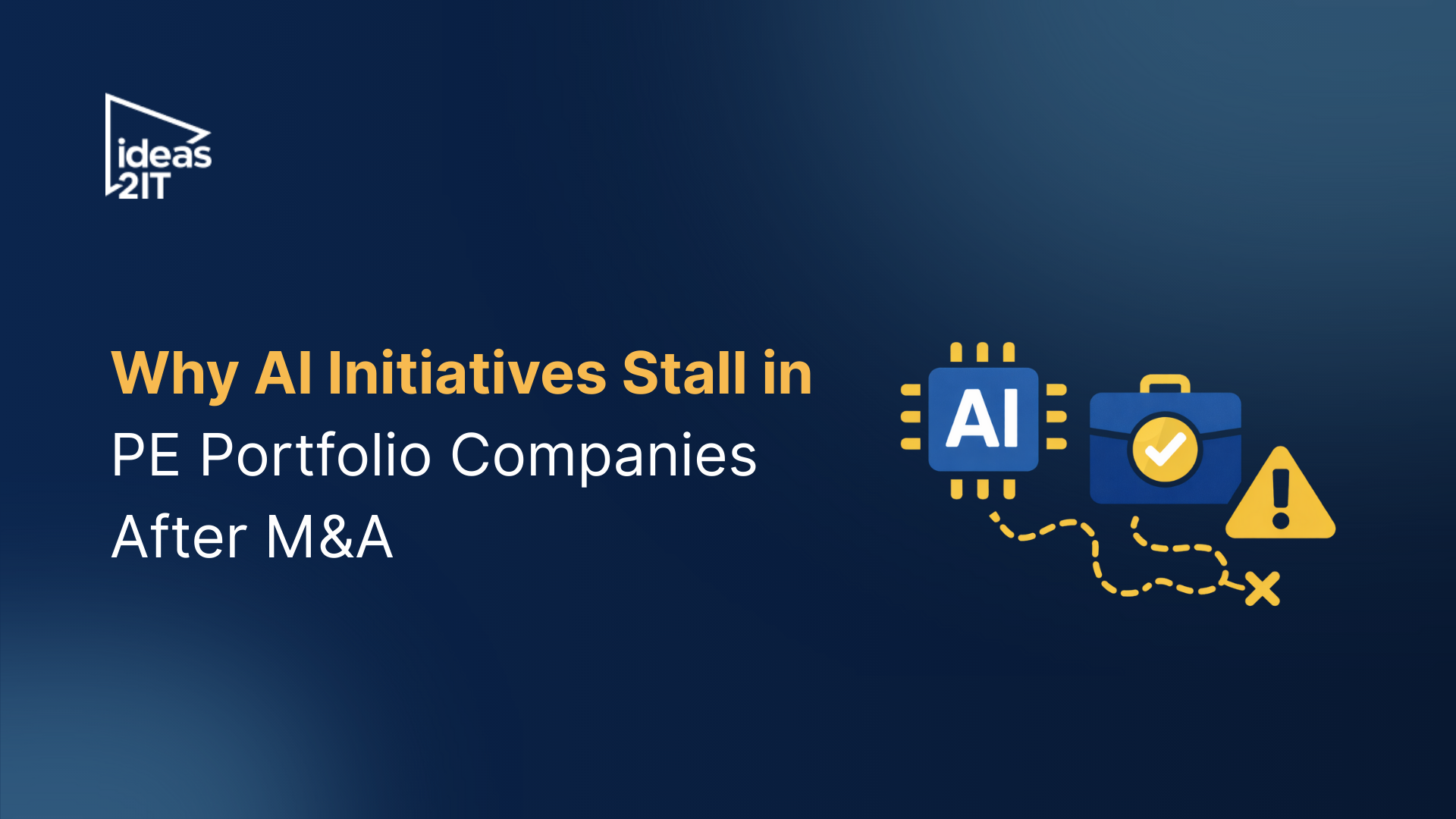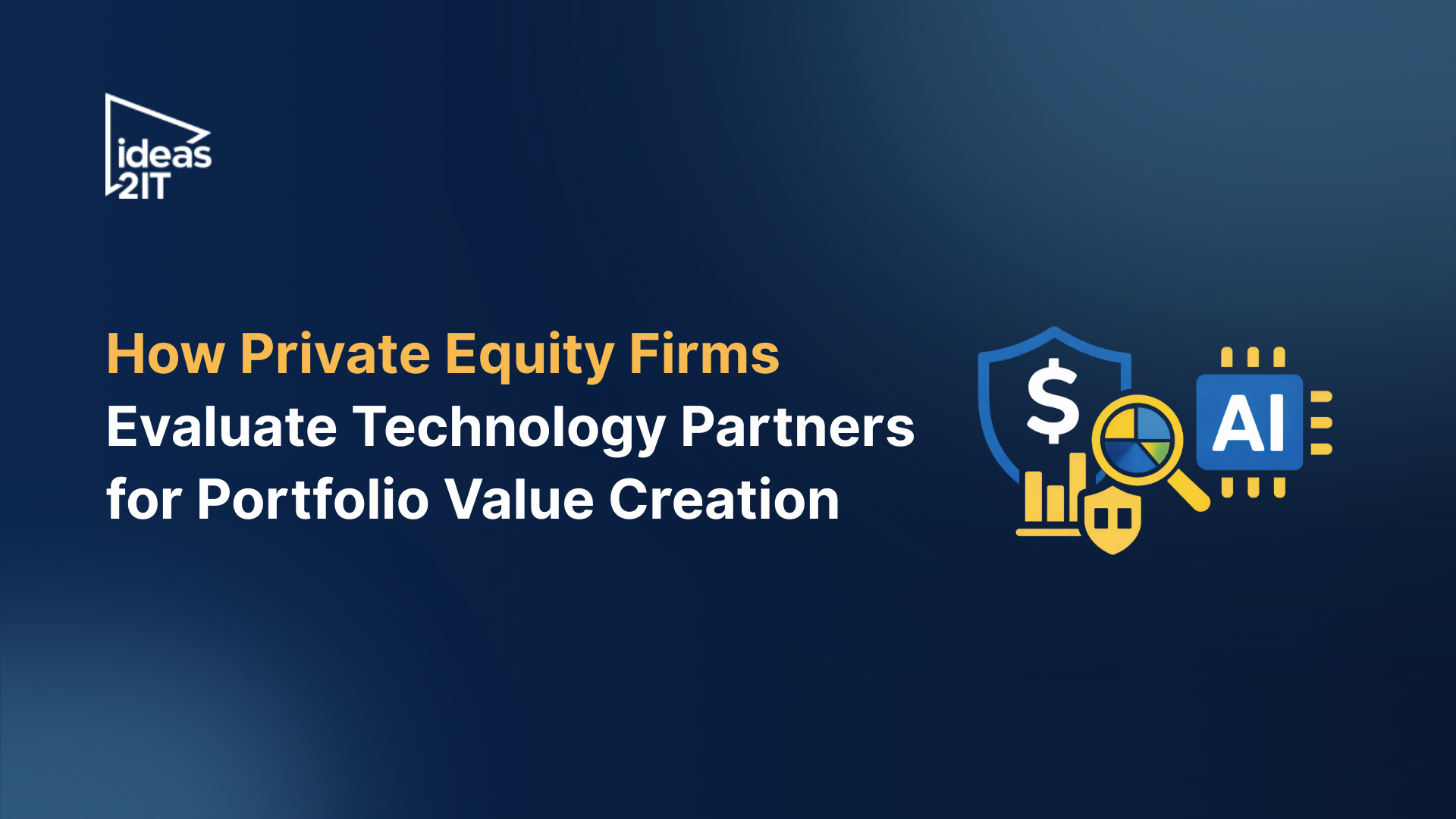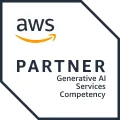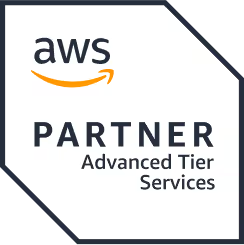Top 10 AI Healthcare Software Development Companies (2026)
TL'DR
- AI is redefining healthcare, making clinical decisions faster, automating admin work, and personalizing patient care.
- The right AI partner can help you reduce risk, streamline compliance, and drive measurable clinical and operational outcomes.
- This guide spotlights the top AI healthcare software firms, how to assess them, and why choosing the right one is critical for long-term success.
2026 is shaping up to be the year of broader AI adoption in healthcare, building on the momentum from 2024. The industry is under mounting pressure to improve care quality, reduce costs, and manage vast volumes of medical data. AI powered custom healthcare software development is emerging as a critical enabler, helping healthcare organizations overcome staffing shortages, rising operational demands, and the overwhelming influx of clinical knowledge.
Recent surveys highlight this acceleration. According to McKinsey, 85% of healthcare leaders are now exploring or implementing generative AI solutions, while AMA reports that two out of three physicians used AI in their practice by late 2024. These tools are already enhancing diagnostics, personalizing treatments, streamlining prior authorization, and improving supply chain resiliency. With its ability to process massive datasets, AI is directly contributing to better patient outcomes, higher operational efficiency, and measurable cost reductions across the healthcare ecosystem.
At the same time, the risk landscape is escalating. In 2024 alone, U.S. healthcare providers reported 720 data breaches, exposing over 180 million patient records, a sharp rise from the prior year. High-profile incidents such as the Change Healthcare breach underscore the urgent need for secure, HIPAA-compliant architectures. This reality is fueling demand for custom AI solutions that not only accelerate innovation but also safeguard patient data.
In this blog, we will examine how AI is transforming clinical, operational, and financial outcomes in healthcare and introduce the top AI healthcare software development companies in 2026 that are leading this shift with proven, customized solutions.
Also Read: AI adoption frameworks in healthcare
How AI is Shaping the Future of Medicine
Artificial Intelligence is making a significant impact on healthcare, improving processes that were once inefficient or overwhelming into optimized, data-driven operations. The integration of AI is not just a trend but a strategic advantage for healthcare organizations looking to improve patient outcomes and operational efficiency in an increasingly complex environment. Leading AI healthcare software development companies are now building tailored platforms that make these advancements practical and scalable.
Here’s how AI in healthcare software development is driving tangible value across the ecosystem:

1. Enabling Higher-Quality Patient Care
AI-powered Clinical Decision Support (CDS) systems are helping clinicians make faster, more accurate, and cost-effective decisions at the point of care. By analyzing real-time patient data and embedding insights directly into electronic health records, CDS tools reduce reliance on memory and manual review.
Healthcare waste in the U.S. is a significant issue, accounting for approximately 25% of total healthcare spending. Interventions that reduce waste, like CDS systems, have the potential to save $191 billion to $286 billion. These systems help cut unnecessary treatments and reduce hospital stays, with CDS tools saving about $1,000 per patient encounter, contributing to these substantial savings.
2. Enhancing Clinical Research and Drug Discovery
AI is reshaping how clinical trials are designed, executed, and accelerated. Using Machine Learning (ML) and Natural Language Processing (NLP), AI can identify patterns across millions of patient records, surface subtle markers, and improve recruitment diversity.
Recent studies show that AI is already achieving high accuracy in early disease detection across a range of conditions. For example, hybrid AI models combined with convolutional neural networks (CNNs) have reached 87.8% accuracy in detecting lung cancer through chest X-rays and CT scans. Deep learning models analyzing MRI and EEG data have achieved 89.2% accuracy in predicting Alzheimer’s disease at early stages. Cardiovascular disease prediction using neural networks has also reached 90.4% accuracy, based on inputs like ECGs and lifestyle data.
These advancements are not just academic. They are reshaping how diseases are diagnosed, how trials are structured, and how quickly life-saving interventions can be delivered. This is where artificial intelligence healthcare solutions play a key role in accelerating discovery and improving outcomes.
3. Optimizing the Healthcare Workforce
Staffing shortages are a growing concern in healthcare, with studies projecting that over 6.5 million healthcare professionals in the U.S. will leave their positions by 2026, leaving a gap of over 4 million workers. AI can help mitigate this crisis by optimizing workflows and automating time-consuming tasks.
For example, AI-powered electronic Prior Authorization (ePA) solutions have helped reduce administrative burdens, speeding up decision-making and improving care delivery. As of 2024, many healthcare organizations are already well on their way to meeting the 2027 requirement for automating prior authorization activities. Healthcare providers are reporting that ePA has reduced the time to get responses on prior authorization requests from days or weeks to just hours or a few days.
Also Read: How RPA supports workforce automation
4. Enhancing Healthcare Supply Chain Resiliency
According to Premier’s 2024 Resiliency survey, four out of five healthcare providers and supplier organizations expect supply chain challenges to worsen or remain the same over the next year – an uptick in respondents’ concerns from the year prior.
AI-powered predictive models provide healthcare organizations with long-term visibility into their supply chains, allowing them to anticipate shortages before they occur. These AI solutions for healthcare providers can predict product demand, optimize inventory management, and suggest clinical alternatives to ensure continuity of care.
And it doesn’t stop at forecasting. AI is now driving digitized procure-to-pay workflows, allowing health systems to cut waste, minimize manual errors, and prioritize purchases from high-value contracts. This shift in procurement is becoming a lever for cost control and stronger negotiating power, especially for CIOs and CTOs integrating ERP systems.
For example, a leading senior care network partnered with Ideas2IT to modernize its long-term geriatric care systems. They built a HIPAA-compliant, cloud-based EHR and practice management platform using Azure and integrated tools like Dr. First and PointClickCare. The result? A 25% reduction in CMS quality reporting time, a 25% drop in denied claims, and a 5% increase in daily encounter volume. Read the full case study here.
With AI proving its value across care delivery, research, supply chain, and operations, healthcare leaders are now asking a different question, not whether to invest in AI but who to trust to build it.
Pro Tip:
When integrating AI into healthcare, prioritize augmented intelligence that supports clinicians rather than replaces them. This approach improves patient outcomes, strengthens trust, and ensures compliance with privacy and equity standards Want to build an AI solution tailored to your hospital or care network?
Contact Ideas2IT’s Healthcare Engineering Team to explore a use‑case‑driven approach.
Top 10 AI-Powered custom healthcare software development Companies
Healthcare providers are increasingly turning to software partners who can handle complex data workflows, modernize legacy systems, and support innovation at scale. Below are 10 custom software development companies in healthcare. Each brings unique strengths in product engineering, systems integration, and scalable delivery models.

1. Ideas2IT
Founded in 2009, Ideas2IT has deep expertise in AI powered custom healthcare software development, with a proven track record of solving data-heavy and compliance-sensitive challenges. The company specializes in building HIPAA-compliant, FHIR-aligned platforms that modernize healthcare systems, improve efficiency, and enhance patient outcomes.
Its healthcare portfolio includes AI-driven clinical decision support, payer-provider interoperability, population health analytics, and automated care coordination. Ideas2IT’s solutions are architected with HIPAA/GDPR compliance and FDA-aligned environments, ensuring both security and scalability.
With strengths in generative AI, natural language processing (NLP), and robotic process automation (RPA), the company has helped clients reduce claim denials, accelerate prior authorization, and cut documentation time by up to 80% in real-world deployments.
Backed by 700+ engineers, Ideas2IT has served over 150 global clients, including Medtronic Labs, Microsoft, Oracle, and Facebook. Its healthcare ventures, such as Element5 (RPA for post-acute care) and IdeaRX (pharma supply chain platform), showcase its innovation DNA, with core teams often stepping into CXO roles to scale impact.
Focus Areas
- AI/ML for healthcare data automation
- Custom clinical systems aligned with interoperability standards
- HIPAA-compliant infrastructure and PHI handling accelerators
- Mobile apps and enterprise mobility for care coordination
- Data science-led process optimization
Technologies Used: AI & ML, AWS, Azure, Google Cloud, Data Science, Hadoop, Spark, Blockchain, IoT, AngularJS, Node.js, ReactJS, Selenium, Appium, and Microservices Architecture.
2. Achievion Solutions
Achievion Solutions, founded in 2013 and based in Washington, DC, offers custom AI solutions with a focus on healthcare. The company develops AI-driven solutions aimed at process optimization and enhancing diagnostic precision.
Achievion works with healthcare providers to reduce administrative tasks and improve operational efficiency, particularly through applications like telemedicine and predictive analytics. The company also has partnerships with organizations such as the National Institutes of Health (NIH), supporting its work in healthcare innovation.
Focus Areas
- AI for care path prediction and patient triage
- Custom diagnostic platforms for remote care
- Process automation in payer-provider interactions
Technologies Used: Machine learning (ML), natural language processing (NLP), cognitive computing, TensorFlow, scikit-learn, Python, Node.js, React Native.
3. Solulab Inc.
SoluLab Inc., a technology solutions provider founded with a focus on emerging technologies, specializes in blockchain, metaverse, AI/ML, IoT, and mobility solutions. Based in the U.S., the company delivers tailored solutions across various industries, including healthcare, logistics, education, and finance.
SoluLab works with clients to develop decentralized applications, smart contracts, and immersive 3D experiences for the metaverse. Their approach integrates advanced technologies with a comprehensive process of discovery workshops, strategy design, development, and support to ensure successful project outcomes.
Focus Areas
- Blockchain integration for health data exchange
- Predictive intelligence using AI/ML
- Mobile-first platforms for patient engagement
- IoT solutions for remote health monitoring
Technologies Used: Blockchain (Hyperledger), AI/ML frameworks (TensorFlow), IoT platforms, AR/VR tools, cloud computing (AWS, Azure), and custom software stacks.
4. Indium Software
Founded in 1999 and headquartered in Sunnyvale, CA, Indium Software is a global leader in digital engineering services, specializing in AI-driven solutions for industries such as healthcare, financial services, retail, and gaming. With a team of over 3,500 associates worldwide, Indium serves Fortune 500 and Global 2000 companies across North America, India, and the Asia-Pacific region.
The company focuses on client-centric innovation and digital transformation by utilizing advanced technologies like Generative AI, data engineering, and low-code development.
Focus Areas
- teX.ai: A NLP-based text analytics platform for extracting insights from unstructured data.
- ibriX: A Databricks accelerator that helps optimize big data processes.
- uphoriX: A smart test automation platform for enhancing quality assurance processes.
Technologies Used: Generative AI, machine learning, natural language processing (NLP), cloud platforms (AWS, Azure, GCP), and low-code tools like Mendix.
5. Techmagic
Founded in 2014 in Lviv, Ukraine, TechMagic is an end-to-end software development company specializing in innovative digital products with a strong focus on healthcare and fintech industries. TechMagic provides full-cycle software development, from discovery to MVP delivery, deployment, and ongoing maintenance. With a team of over 300 experts, they use agile practices and the latest technologies to help businesses scale and stay competitive.
Focus Areas
- Scalable web and mobile applications
- Secure cloud-native backends for healthcare apps
- UX/UI for patient and clinician-facing platforms
Technologies Used: Node.js, Nest.js, Java, .NET, PHP, Python for backend development; Next.js, React, React Native, Angular, Vue.js for frontend; and AWS, Google Cloud Platform (GCP), and Azure for infrastructure.
6. Intellectsoft
Founded in 2007 and headquartered in Palo Alto, California, Intellectsoft is a digital consultancy specializing in innovative engineering solutions. The company works with global organizations and Fortune 500 companies, operating across offices in the U.S., U.K., Nordic region, and Eastern Europe. Intellectsoft’s mission is to help enterprises accelerate technology adoption and solve complex digital challenges, delivering tailored solutions for businesses ranging from startups to large enterprises.
Focus Areas
- Custom EMR/EHR mobile apps
- Blockchain for secure medical data workflows
- Enterprise systems integration
Technologies Used: Cognitive computing, blockchain, IoT, augmented reality (AR), and machine learning to deliver cutting-edge solutions
7. Netguru
Founded in 2008 and headquartered in Poznań, Poland, Netguru is a digital consultancy and software development company. With over 15 years of experience and a team of more than 600 professionals, Netguru has delivered over 2,500 projects globally, helping startups, enterprises, and Fortune 500 companies innovate and transform digitally.
The company focuses on building custom software solutions that solve complex business challenges while enhancing user experiences, emphasizing agility, collaboration, and innovation.
Focus Areas
- AI-based decision support
- Business process automation for health systems
- User experience design in clinical interfaces
Technologies Used: Machine learning (ML), artificial intelligence (AI), IoT, cloud computing (AWS, GCP), and blockchain.
8. Emergent Software
Emergent Software was founded in 2015 as a spinoff from Emergent Networks, which has been providing IT services since 2003. Headquartered in Saint Paul, Minnesota, it specializes in custom software development, consulting, and cloud-based solutions.
The company has grown to become a trusted Microsoft-focused technology partner. The company specializes in Microsoft ecosystem services, including Azure cloud consulting, SQL Server database management, custom software development, and SharePoint solutions.
Focus Areas
- Azure-backed healthcare applications
- BI dashboards and analytics tools
- SharePoint portals for provider networks
Technologies Used: Microsoft Azure, SQL Server, Power BI, .NET Core, and C#.
9. Chetu
Founded in 2000 by Atal Bansal, Chetu Inc. is a US-based software development company headquartered in Sunrise, Florida. It provides tailored software solutions to businesses worldwide, serving startups, SMBs, and Fortune 5000 companies. The company operates globally.
Chetu specializes in custom software development, mobile app development, systems integration, cloud technologies, business intelligence, quality assurance, and IT staff augmentation across 40+ industries.
Focus Areas
- AI-based predictive insights for patient outcomes
- Custom modules for EHR and billing
- Workflow automation in care delivery
Technologies Used: AI/ML, Azure, AWS, IoT, Blockchain
10. Arkenea
Founded in 2011 and headquartered in Cary, North Carolina, Arkenea is a healthcare-focused software development company that delivers custom solutions to healthcare organizations, including HealthTech entrepreneurs, medical practices, and Fortune 500 companies. Arkenea combines North America-based project management with a skilled development team in India, providing scalable and secure software solutions tailored to the healthcare industry.
Focus Areas
- Patient-facing telehealth solutions
- Generative AI for clinical task automation
- EHR/EMR system customization
- Remote care delivery platforms
Technologies Used: ML, generative AI, cloud computing (AWS), API integrations, and frameworks like AngularJS and NodeJS.
While these companies bring strong technical capabilities to the table, choosing the right partner for your healthcare initiative requires more than a list. It demands alignment with your strategy, compliance needs, and growth plans.
Pro Tip:
AI isn’t a trend. It’s the new standard. Choose a partner that brings clinical insight, secure design, and measurable ROI to every project.
Comparison Table of AI Healthcare Software Development Leaders
How to Choose the Right AI-Powered Software Development Partner in Healthcare
When selecting a custom AI software development company for healthcare, enterprise decision-makers must ensure their choice aligns with strategic goals and operational needs. The right partner can drive innovation, streamline processes, and ultimately deliver better patient care.
If you're evaluating development partners in 2026, these seven questions can help you make the right call.
1. Does this partner understand our business problem, not just the software we’re asking for?
- Are they aligned with our clinical, operational, or patient care goals?
- Can they build a solution that adapts as our environment changes?
- Are they shaping the solution to solve a clinical or operational pain point?
- Can they articulate how the software supports measurable goals like reduced readmissions or faster triage?
Look for Teams that start with the "why" before jumping into solutions.
2. Do they have actual healthcare domain expertise and not just ‘experience with AI’?
- Have they been built for regulated environments like HIPAA or FHIR-based ecosystems?
- Can they show working examples of AI in healthcare—from CDS tools to smart scheduling or diagnostics?
- Do their case studies show results, not just deployment?
Look for sector focus and measurable outcomes, not general software success.
3. Is their engineering team technically equipped to handle AI in a healthcare context?
- Do they use modern languages, MLOps pipelines, and privacy-by-design principles?
- Can they explain their approach to handling sensitive data across environments?
- What’s their approach to handling PHI across dev, staging, and production?
- Do they follow DevSecOps practices and provide audit trails?
- Can they explain how they manage model drift, retraining, and version control in a clinical setting?
Look for clean, modular code practices and familiarity with frameworks like FHIR, HIPAA-safe architectures, and real-world model deployment.
4. Will they work as a true collaborator or just execute tickets?
- How do they handle sprints, status updates, and feedback loops?
- Do they offer cross-functional teams (PMs, compliance experts, QA, engineers)?
- How do they deal with change requests mid-cycle?
Look for a structured yet flexible delivery model that supports co-creation and long-term thinking.
5. Can they build compliance into the architecture from day one?
- How do they design for HIPAA, GDPR, and other frameworks at the infrastructure and code level?
- Can they support FHIR API integration, consent tracking, and access controls out of the box?
- Do they support encryption at rest and in transit, role-based access, and audit trails?
- How do they manage breach protocols or third-party integrations?
Look for security-first thinking and evidence of audit-readiness, not just promises.
6. Can they prove feasibility with a prototype or POC before scaling?
- Are they open to running a time-boxed pilot with defined success criteria?
- Will they validate a single workflow (e.g., patient intake or triage) before full delivery?
- Do they use early prototypes to test assumptions, not just impress with UI?
Look for teams willing to build trust by showing how they think, not just what they deliver.
7. Is their pricing transparent and tied to long-term value?
- Do they provide detailed breakdowns across dev, infra, support, and compliance?
- Are licensing, IP rights, and ongoing maintenance clearly defined?
- How do they measure success post-launch?
Look for structured contracts with defined outcomes, support terms, and total cost clarity.
Once you’ve defined what to evaluate in a partner, from domain expertise to architectural discipline, the next step is finding someone who actually delivers on all fronts. That’s where Ideas2IT stands out.
Why Healthcare Enterprises Choose Ideas2IT
After working through the due diligence process, most healthcare leaders arrive at the same problem: finding a partner who can move fast, stay compliant, and build for your unique operating context.
Ideas2IT doesn’t retrofit generic AI frameworks into healthcare. We co-develop healthcare-specific software that’s HIPAA-compliant from day one and designed around your actual care, operations, and data constraints. Our bespoke healthcare technology solutions providers improve patient care, enhance operational efficiency, and optimize workflows while ensuring full compliance.
Here’s how Ideas2IT brings tangible value across the healthcare spectrum.
1. Provider (hospitals, clinics, care teams)
Your physicians, care teams, and operational staff need more than digital tools; they need workflows that work. We help you:
- Deploy AI-powered diagnostic assistance to improve speed and accuracy.
- Automate scheduling, referrals, and inbox triage to free up clinical time.
- Implement population health platforms that unify data for chronic care management.
- Build remote monitoring systems for early interventions in high-risk patients.
2. Payer (insurance companies)
Payers are under pressure to control costs while delivering measurable care quality. Our platforms are built for exactly that:
- Build communication platforms that simplify payer-provider interactions.
- Create dashboards that track care quality metrics aligned to value-based models.
- Use predictive modeling to identify high-cost cases early and take pre-emptive action.
- Deploy care coordination modules for seamless handoffs and accountability.
3. Patient (end users receiving care)
Healthcare consumers expect faster responses, more clarity, and fewer handoffs. We help you meet those expectations with the following:
- Patient-facing mobile platforms for real-time updates and care access.
- Clinical decision support systems to reduce diagnostic delays.
- IoT and wearable integrations that support ongoing monitoring and proactive care.
- Patient data validation and aggregation tools for complete care visibility.
4. Partner (labs, HIEs, third-party tech vendors)
Whether you're integrating with labs, HIEs, research networks, or third-party providers, data fluidity matters. Ideas2IT delivers:
- FHIR/MIRTH-compliant exchange models for seamless interoperability.
- Unified data layers that connect fragmented systems across facilities.
- Custom APIs for real-time integrations into EHRs, CRMs, and analytics tools.
- Decision support platforms that offer a single view across sources.
Your next healthcare software initiative isn’t just about building features. It’s about choosing someone who understands the critical factors i.e. regulatory risk, operational overload, care quality, and system-level trust.
At Ideas2IT, we’ve worked with leading healthcare innovators to reduce manual overhead, improve care coordination, and build systems that adapt and scale with changing needs, not against them.
But don’t just take our word for it. Here’s what our clients say:
"We witnessed an 815% increase in patient enrollment for our Empower Health Program and an overall 184% increase across all our programs. I highly recommend Ideas2IT."
— Ruchika Singhal, President – Medtronic Labs
For instance, a US-based therapy chain partnered with Ideas2IT to build a HIPAA-compliant SaaS platform tailored for physical therapy practices. Documentation time dropped by 80%, evaluations were completed in under 7 minutes, and the system streamlined scheduling, billing, and care planning into one unified experience. Read the full case study here.
This kind of outcome doesn’t come from a generic tech stack. It comes from deep alignment with client goals, industry-specific accelerators, and solutions mapped directly to business objectives.
Start your next healthcare AI initiative with Ideas2IT connect with one of our IT healthcare specialists today.
Conclusion
AI is no longer just a trend in healthcare; it's becoming a core component of how organizations improve care, manage risk, and drive efficiency. From improving diagnosis accuracy to streamlining workforce capacity and securing supply chains, AI is addressing problems that can’t be solved through scale or staffing alone.
But technology alone isn’t the differentiator. The real impact lies in how well it’s applied, how securely it’s built, and how closely it aligns with clinical and business goals. That’s why selecting the right AI development partner is not just a tactical but a strategic choice.
AI isn’t the finish line — it’s the foundation. The right partner can help you build responsibly, scale efficiently, and deliver better care from day one.
Reference:









.png)
.png)
.png)
.png)












